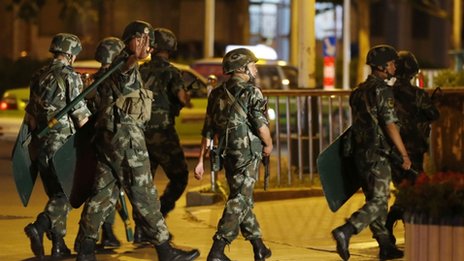State media warn of Xinjiang fighters training in Syria, while Hong Kong newspapers call on the city’s government to start political reform dialogue quickly to avert crisis.
 Communist Party newspaper the People’s Daily and the Xinjiang Daily both call for a tougher crackdown against “terrorist violence” in Xinjiang, days after 35 people were killed in clashes there.
Communist Party newspaper the People’s Daily and the Xinjiang Daily both call for a tougher crackdown against “terrorist violence” in Xinjiang, days after 35 people were killed in clashes there.
The Global Times says people in Xinjiang and the whole of China should show no fear towards “terrorists” or the “accusations of the West” over the security crackdown in the region.
Beijing traditionally blames attacks in Xinjiang – home to the minority Muslim Uighur population – on “terrorists”. Uighurs say ethnic tensions are fuelled by Beijing’s heavy-handed rule.
Confirming details of incidents is difficult because the information flow out of Xinjiang is tightly controlled.
Syrian Ambassador to China Imad Moustapha tells the state-run Global Times that at least 30 members of the East Turkistan Islamic Movement (Etim), who are deemed a Xinjiang “terrorist organisation” by Beijing, have sneaked into Syria from Turkey.
“The aim of these ‘Etim’ members is most likely to be fighting in the Syrian city of Aleppo. This still cannot be fully confirmed, but it is certain that these ‘Etim’ elements trained at the Pakistan-Afghan border, and then went to southern Turkey,” Mr Moustapha says.
The English-language version of the Global Times also interviews Memeti Aili, whom the newspaper describes as a 23-year-old ethnic Uighur who was caught by police recently when retuning to Xinjiang to carry out a “violent attack” ordered by Etim.
It says Memeti Aili was approached by the East Turkistan Education and Solidarity Association, a Turkish-based exile group, while he was studying in Istanbul and asked to go to Aleppo to receiving combat training.
An anti-terrorism official also tells the Global Times that about 100 people like Memeti Aili have gone to Syria to gain experience in combat and terrorist attacks while fighting alongside Syrian rebels since last year.
Democracy march ‘censored’
In other news, Hong Kong’s annual 1 July protest march was censored by the mainland state media and even the city’s handover anniversary celebrations were given low-key and cursory coverage.
A bilingual editorial in the Global Times plays down the march as having a lower turn-out than before and as a routine occurrence that merits little concern or fear from the mainland.
“From the perspective of the mainland public, Hong Kong is a paradise for tourists which provides good bargaining. Few mainland visitors are interested in Hong Kong politics, and almost nobody believes ‘severe problems’ will happen in Hong Kong, such as a confrontation with the central government or ‘Hong Kong independence’,” it adds.
However, in Hong Kong, the Beijing-backed the Ta Kung Pao accuses the 1 July march organisers of trying to bring down Chief Executive CY Leung’s government, seek covert “Hong Kong independence” and to weaken China’s communist rule and curb its modernisation.
“These foreign flunkey ‘Hong Kong traitors’ who are willing to act as henchmen for foreign anti-China and anti-Communist forces must be attacked and exposed with the sternest attitude and maximum effort,” the newspaper stresses.
Commentaries in the Ta Kung Pao and the Beijing-linked the Wen Wei Po also cast doubts over the march organisers’ turnout figure of 430,000 as opposed to the police’s figure of 66,000.
The Wen Wei Po also insinuates that the organisers may have exaggerated the turn-out figure to secure more money from US government-funded groups. However, most Hong Kong newspapers accept the organisers’ tally of 430,000 people at the march.
Editorials in the Hong Kong Economic Journal, the Hong Kong Economic Times and the South China Morning Post say CY Leung’s pledge to hold consultations at an appropriate time on introducing universal suffrage in 2017 fell short of the expectations of the demonstrators.
The editorials all urge the government to start consultations as soon as possible to prevent further political turmoil.
The Ming Pao calls on all sides to take advantage of Mr Leung’s pledge on consultations and for the pro-establishment camp to start dialogue with the pan-democrats on political reform.
The Oriental Daily News says the typhoon could not deter people from voicing grievances over livelihood difficulties and says incompetent governance, chaos and social rifts have reached “intolerable proportions”.
The Sing Tao Daily, however, says the economy is in much better shape than during the 1 July protest march in 2003.
It believes that livelihood policies are less likely to placate the public’s impatience over the slow pace of political reform this time.
“The central government should trust the wisdom of Hong Kong people and implement genuine universal suffrage, so that a chief executive with credibility and integrity can come to power,” the Apple Daily concludes.
BBC















